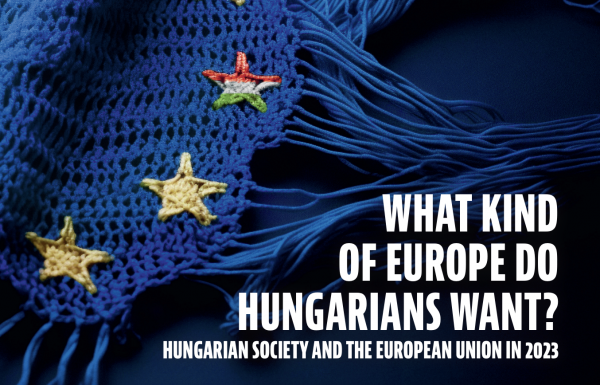
As a think tank committed to Hungary’s European integration, Policy Solutions has always regarded the monitoring of the political and policy relations between Hungary and the European Union as one of its key responsibilities. In recent years, we have made it a priority to publish research that digs deeper than the standard “remain or leave”-type of surveys about Hungarians' attitudes towards the EU. Instead, we have undertaken more nuanced investigations of how Hungarians see their country’s future in the European Union. The present publication, which also marks the 15th anniversary of the founding of Policy Solutions, was drafted in the spirit of building on this worthy tradition.
Our study will review what the EU means to Hungarians in 2023, what they regard as the most important benefits and disadvantages of membership, and how they assess the economic balance of EU membership on the whole. We put a special focus on the Hungarian voters’ assessment of the processes taking place at the EU level: what values should the EU stand for and what role should it play globally in the future? In order to find out what kind of Europe Hungarians want, we also asked them what new member states they would admit into the European Union. We further examined in which policy areas Hungarians would want to give the EU more responsibilities, and which policy areas they would prefer to keep in the exclusive control of the member states. Furthermore, our survey sought to gauge how deep the imprint of the government’s eurosceptic campaign is, and how pronounced the fears and grievances in Hungarian society are concerning the EU. Our previous research on the subject also allows us to capture the changes over time for many of the questions we looked at.
Key findings:
- Support for Hungary’s EU membership consistently remains over 70% As of 2023, 72% said that they would vote for Hungary to remain in the EU if a referendum were held on the issue. All of the surveys performed by Policy Solutions in the past two years have shown at least 70% support for EU membership, and our most recent study confirms that despite the Orbán government’s Eurosceptic campaigns, the public’s commitment to EU membership has not been shaken.
- Hungarians primarily view EU membership favourably because of the financial benefits. The elimination of physical borders and the Schengen Agreement providing free movement came second, while the opportunity to work and study abroad rounded out the top three.
- The biggest drawbacks of EU membership: excessive regulation, weakened national sovereignty, migration, freezing of EU funds, and sanctions policies.
- A majority of Hungarians (50%) perceive that their country receives more money from the EU budget than it contributes to the latter. At the same time, 36% of respondents assessed that Hungary has become a net contributor to the EU budget. As compared to two years earlier, in 2023 we found a seven-percentage-point increase in the share of those who believe that Hungary is a net contributor to the EU budget. Half of the ruling Fidesz party’s voters believe that Hungary has become a net contributor in recent years.
- Two-thirds of Hungarians (66%) believe that our economy profits substantially from Hungary’s EU membership, while 28% of respondents disagreed with that assessment. Nevertheless, on this question, too, our data indicate a slow erosion of the EU’s economic legitimacy: as compared to two years earlier, in 2023 respondents were seven percentage points less likely to believe that our EU membership pays off economically.
- What the EU stands for today: Defending democracy, free movement, rising standards of living. In 2023, both government party supporters and opposition voters were most likely to mention peace as the principle they want the EU to stand for.
- With respect to the EU’s global role, respondents were most likely to think that the bloc should be a role model for the rest of the world as a “social Europe” (40%). This was followed by the preference for a unified economic stance in the global economy (33%). The share of those who believe that the EU should be a global defender of democracy, the rule of law, and human rights was similarly high (32%).
- Hungarians would prefer to spend EU funds on healthcare and improving the situation of disadvantaged regions.
- Hungarian society is open to EU enlargement, but the majority is opposed to allowing Ukraine to join.
- The majority of Fidesz voters also agree that all the milestones should be met in order to gain access to EU funds; however, the suspension of the Erasmus programme divides Hungarian society.
- Two-thirds of the Hungarian public (67%) said that if Hungary meets the preconditions, then the euro should be introduced. A quarter of respondents (27%) disagreed with this position. Supporters of introducing the euro in Hungary were in the majority in all segments of the population by partisan preferences.
- The majority supports Romania’s accession to Schengen and the creation of a joint European army.
Authors: András Bíró-Nagy - Vanessza Juhász - Áron Szászi - Attila Varga
The study was realised with the support of the Friedrich-Ebert-Stiftung Budapest.
Policy Solutions is a progressive political research institute based in Budapest. It was founded in 2008 and it is committed to the values of liberal democracy, solidarity, equal opportunity, sustainability and European integration. The focus of Policy Solutions’ work is on understanding political processes in Hungary and the European Union. Among the pre-eminent areas of our research are the investigation of how the quality of democracy evolves, the analysis of factors driving euroscepticism, populism and the far-right, and election research.
Follow us on Facebook!